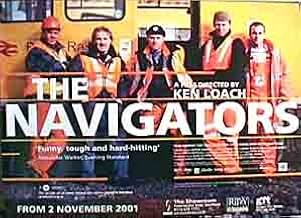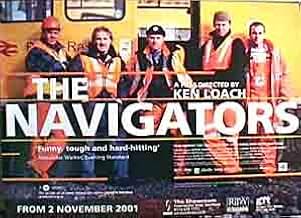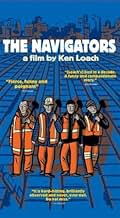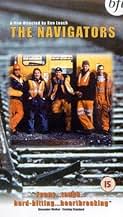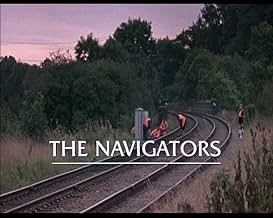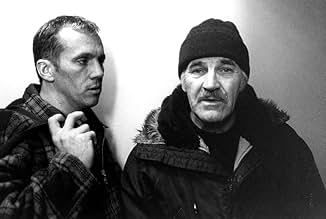AVALIAÇÃO DA IMDb
6,9/10
3,2 mil
SUA AVALIAÇÃO
Adicionar um enredo no seu idiomaFive Yorkshiremen try to survive after the British Rail is bought out by a private company.Five Yorkshiremen try to survive after the British Rail is bought out by a private company.Five Yorkshiremen try to survive after the British Rail is bought out by a private company.
- Direção
- Roteirista
- Artistas
- Ganhou 1 prêmio BAFTA
- 3 vitórias e 3 indicações no total
Thomas Craig
- Mick
- (as Tom Craig)
Angela Forrest
- Tracy
- (as Angela Saville)
Avaliações em destaque
As always, a social issue is beautifully intertwined with personal drama: sad, funny, true like life itself. And cinema itself. It's a relief to see someone can entertain and move us in this way, that's definitely not the present-day Hollywood way. On the other hand, Loach's career is brilliant from beginning to end with the only possible exception of Carla's Song that I consider a faux-pas. Like all great artists, Loach with this films add something to our understanding of ourselves, and our present history. I supposed that you understood I liked it. Still it seems I've lost the best: the liverpuldian parley. In Italy unfortunately all these films come dubbed.
10Jose E
This is by no means a movie to be seen for pure entertainment,. This is a REALISTIC movie, so those looking for kicks stay away. Otherwise you will be so disappointed.
I like this movie so much, especially since is the type of movie Hollywood would NEVER make. It sharply portraits how bad working conditions have gotten over the years (which is something I have witnessed firsthand). Treating people like dirt and firing them without a reason have become an end it itself.
Watching this film takes you to the core of what's going on at most workplaces, which obviously won't delight those who think life is pretty, because it ain't. Put your feet on the ground and search for that beauty - you are not going to find it in the treatment workers are getting anywhere. This is the real world, people, whether we like it or not.
While seeing this movie, never did I feel I was in the cinema. I could relate to what the characters were going through.
Of course the movie has no happy end, but if it did would be unreal.
10/10.
I like this movie so much, especially since is the type of movie Hollywood would NEVER make. It sharply portraits how bad working conditions have gotten over the years (which is something I have witnessed firsthand). Treating people like dirt and firing them without a reason have become an end it itself.
Watching this film takes you to the core of what's going on at most workplaces, which obviously won't delight those who think life is pretty, because it ain't. Put your feet on the ground and search for that beauty - you are not going to find it in the treatment workers are getting anywhere. This is the real world, people, whether we like it or not.
While seeing this movie, never did I feel I was in the cinema. I could relate to what the characters were going through.
Of course the movie has no happy end, but if it did would be unreal.
10/10.
Although it contains some funny moments, this film is no comedy; rather it is a biting satire of the mess that resulted when the Conservative Government in the UK decided to split up and privatise British Rail in 1995 (one wonders why they didn't go all the way and do the same to the highways) as seen through the eyes of track workers. Perhaps the most ludicrous moment is when their supervisor in their newly created regional private company tells the workers to take equipment out to dump bins and smash it up because "it isn't up to scratch, we've got to have high standards now." "But it's perfectly good, can't we sell it?" they protest. "What, sell it to the competition?" is the response. Later they are told that management's streamlining (making staff redundant) has been too successful: they are now too small to be viable and the depot has to close, the rest of the workers have to go. Aside from the almost documentary of the plight of Britain's rail network, there are personal interactions between the working class characters in their daily lives that viewers can empathise with. In all it's well cast, well scripted and well directed.
Saying frankly, I did not enjoy, nor being moved by the movie. The story is neither dramatic nor exciting. The lead character is not well defined and thus easy to confuse the audience. After watching it, being little bit disappointed, I went out to walk my dog, but the movie occupied my thought even after I came home. This is a story in railway workers in the UK, however I could see similar situation in Japan too. In Japan, many companies are gradually recovering from serious downfall. But during the process of profit recovery, companies have replaced fixed-cost employees by variable cost contract workers. As a result, the lifetime employment system has collapsed, and the power of the unions, the members of which are employees only, have been eroding. At the same time, number of contract workers, who do not have systematic training and skills building, has increased. In this trend the gap between peoples of high wages and low wages are becoming wider. British society has been many years the forerunner in the world of winning the rights of workers. But these rights are now too easily forgotten under the pressure of global economy. This is a social crisis in longer term. At least this movie has succeeded to portray this crisis.
England. Mid 1990's. British Rail has been privatised and broken up into separate companies with all work put out to tender with the lowest bidder getting the job. This film follows a group of workers in a Yorkshire depot as the culture gradually changes from a world of union influence into a competitive business world.
This is a very sobering film - it deals with the railtrack situation but is more generally about the selling out of the working man and the beginning of the culture that views people as commodities and expenses, just like the rolling stock and the rails. The film opens with the boss of the depot announcing that the company has been privatised and that things will begin to change. It then follows the culture change over the course of time and concludes with a depressingly innocuous exchange that represents the shattering of previously unified spirits.
The culture change beings with mission statements, competing with work and setting levels for "acceptable deaths and continues with an end to previous agreements and a range of different companies. It is very hard to watch without being angry at the treatment of previously proud men as they are reduced to being costs. Workers are offered voluntary redundancy and those that refuse are gradually forced out. Bosses and chief execs identify those workers that have union ties and work to push them out. Workers are encouraged to join temp agencies at higher wages but without benefits or a steady work load thus saving the company money. Those that make trouble with the crews by insisting on safe working conditions etc are blackballed by the agencies and no more work is put their way. The pressure to cut costs to win jobs continues until unskilled workers are used for rail maintenance because they are paid cash in hand while other crews are forced to use "cost-effective" methods to work without a lookout and run the risk of severe accidents.
For those who think that the experiences of the workers are exaggerated for effect, Ken Loach received regular visits from railtrack workers (taking holidays or sick days) to advise on the film to make sure that it was representative of their experiences - they couldn't officially do it as they feared being blacklisted within the company. These things do go on - the rail companies are led by bosses who get huge bonuses from the shareholders as they drive down operating costs by compromising safety and reducing the workforce costs.
If the film has a major flaw it is the one-sided nature of the script. Workers are all represented as jovial, hardworking types, you know - salt of the earth, put down by bosses who only care about money. The latter may well be true but the way the workers constantly joke etc makes them look too good and the film has far too much sympathy for them for it's own good. Even when a group of workers do something completely abhorrent (the end of the film) it is presented as something that they had no choice about whereas really they should have carried some of the blame.
This film was released in Europe but only had a limited release in the UK as it was screened first on TV. It came shortly after the collapse of Railtrack as the Government put it into administration. It was screened days after the Government tried to cover up a report of failing train performances etc and it was screened as inquiries continue into serious derailments with significant loss of life.
In the UK one major accident killed many passengers and was put down to badly maintained rails. The Chief Exec has thus far escaped charges of manslaughter (despite the findings of the Health & Safety Executive) and also left his job with his huge contractually-obliged bonus, before moving on to another job on another board. For those who think that this film is exaggerated you truly have no idea what's going on in the world of big business.
As the Government continue plans for part privatisation of the London Underground and have further plans to privatise air traffic control this film is a very scary thing. Once we forget the people who make up workforces that only leave numbers. When shareholders become more important than the public and the workers then costs are all that matters and all corners are cut to boost the share price.
This film has it's flaws and will not change Government policy one bit. But this is a very sobering film that will open you eyes to what is done to satisfy shareholders and earn bonuses for upper management.
This is a very sobering film - it deals with the railtrack situation but is more generally about the selling out of the working man and the beginning of the culture that views people as commodities and expenses, just like the rolling stock and the rails. The film opens with the boss of the depot announcing that the company has been privatised and that things will begin to change. It then follows the culture change over the course of time and concludes with a depressingly innocuous exchange that represents the shattering of previously unified spirits.
The culture change beings with mission statements, competing with work and setting levels for "acceptable deaths and continues with an end to previous agreements and a range of different companies. It is very hard to watch without being angry at the treatment of previously proud men as they are reduced to being costs. Workers are offered voluntary redundancy and those that refuse are gradually forced out. Bosses and chief execs identify those workers that have union ties and work to push them out. Workers are encouraged to join temp agencies at higher wages but without benefits or a steady work load thus saving the company money. Those that make trouble with the crews by insisting on safe working conditions etc are blackballed by the agencies and no more work is put their way. The pressure to cut costs to win jobs continues until unskilled workers are used for rail maintenance because they are paid cash in hand while other crews are forced to use "cost-effective" methods to work without a lookout and run the risk of severe accidents.
For those who think that the experiences of the workers are exaggerated for effect, Ken Loach received regular visits from railtrack workers (taking holidays or sick days) to advise on the film to make sure that it was representative of their experiences - they couldn't officially do it as they feared being blacklisted within the company. These things do go on - the rail companies are led by bosses who get huge bonuses from the shareholders as they drive down operating costs by compromising safety and reducing the workforce costs.
If the film has a major flaw it is the one-sided nature of the script. Workers are all represented as jovial, hardworking types, you know - salt of the earth, put down by bosses who only care about money. The latter may well be true but the way the workers constantly joke etc makes them look too good and the film has far too much sympathy for them for it's own good. Even when a group of workers do something completely abhorrent (the end of the film) it is presented as something that they had no choice about whereas really they should have carried some of the blame.
This film was released in Europe but only had a limited release in the UK as it was screened first on TV. It came shortly after the collapse of Railtrack as the Government put it into administration. It was screened days after the Government tried to cover up a report of failing train performances etc and it was screened as inquiries continue into serious derailments with significant loss of life.
In the UK one major accident killed many passengers and was put down to badly maintained rails. The Chief Exec has thus far escaped charges of manslaughter (despite the findings of the Health & Safety Executive) and also left his job with his huge contractually-obliged bonus, before moving on to another job on another board. For those who think that this film is exaggerated you truly have no idea what's going on in the world of big business.
As the Government continue plans for part privatisation of the London Underground and have further plans to privatise air traffic control this film is a very scary thing. Once we forget the people who make up workforces that only leave numbers. When shareholders become more important than the public and the workers then costs are all that matters and all corners are cut to boost the share price.
This film has it's flaws and will not change Government policy one bit. But this is a very sobering film that will open you eyes to what is done to satisfy shareholders and earn bonuses for upper management.
Você sabia?
- Erros de gravaçãoThe vest that John wears in the beginning (with the meter) and end (their last job), is actually a British Rail safety vest, over his Gilchrist coat (when he moves you can see the gray on it). He has the combination on before the company is renamed Gilchrist Engineering.
- ConexõesReferenced in Il était une fois...: Moi, Daniel Blake (2021)
Principais escolhas
Faça login para avaliar e ver a lista de recomendações personalizadas
- How long is The Navigators?Fornecido pela Alexa
Detalhes
- Data de lançamento
- Países de origem
- Centrais de atendimento oficiais
- Idioma
- Também conhecido como
- Demiryolcular
- Locações de filme
- Empresas de produção
- Consulte mais créditos da empresa na IMDbPro
Bilheteria
- Faturamento bruto nos EUA e Canadá
- US$ 3.052
- Fim de semana de estreia nos EUA e Canadá
- US$ 1.940
- 23 de fev. de 2003
- Faturamento bruto mundial
- US$ 1.807.686
- Tempo de duração1 hora 36 minutos
- Cor
- Mixagem de som
- Proporção
- 1.85 : 1
Contribua para esta página
Sugerir uma alteração ou adicionar conteúdo ausente

Principal brecha
By what name was The Navigators (2001) officially released in Canada in English?
Responda
